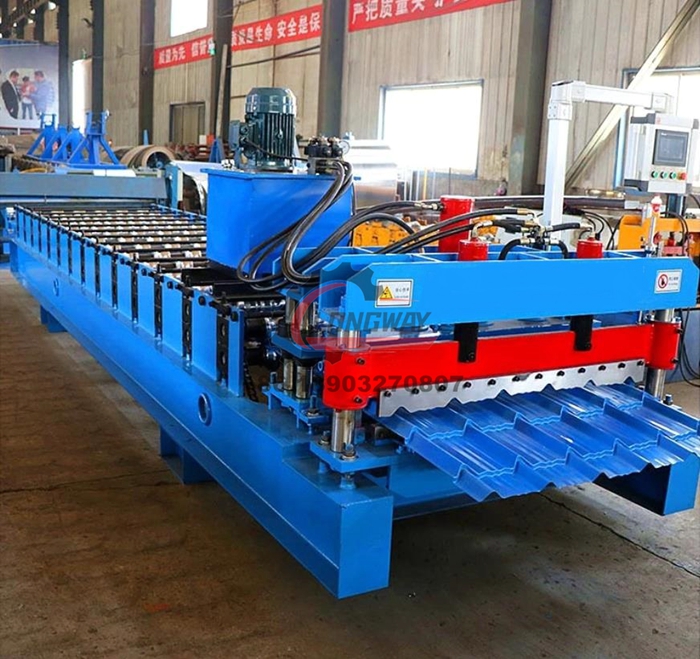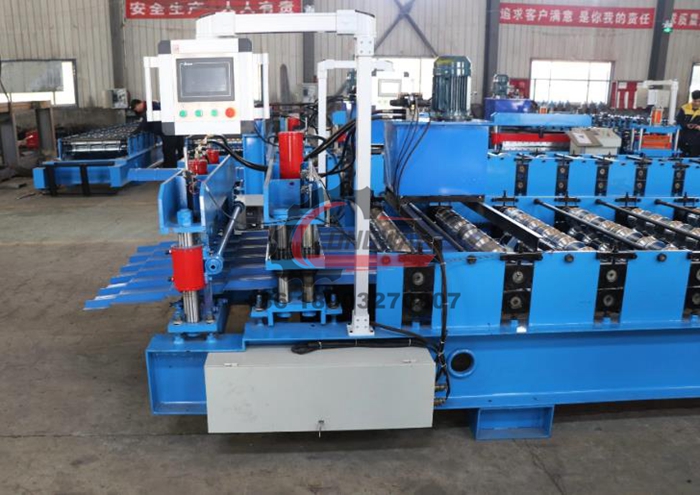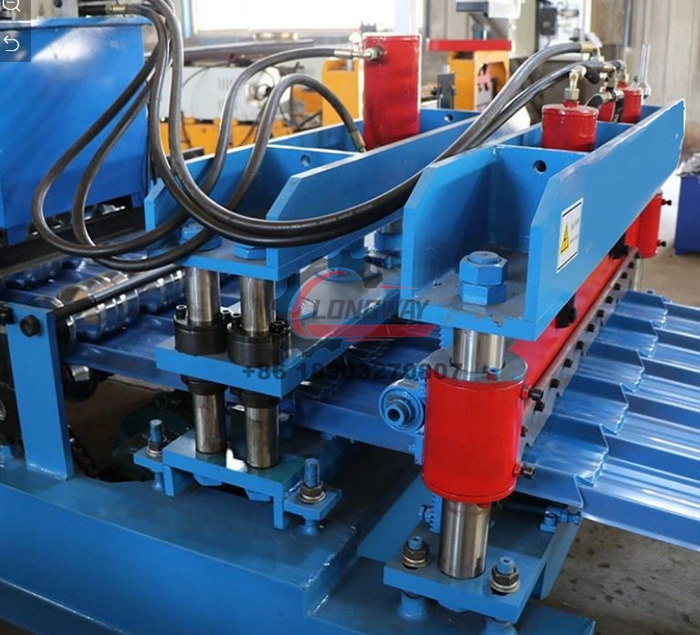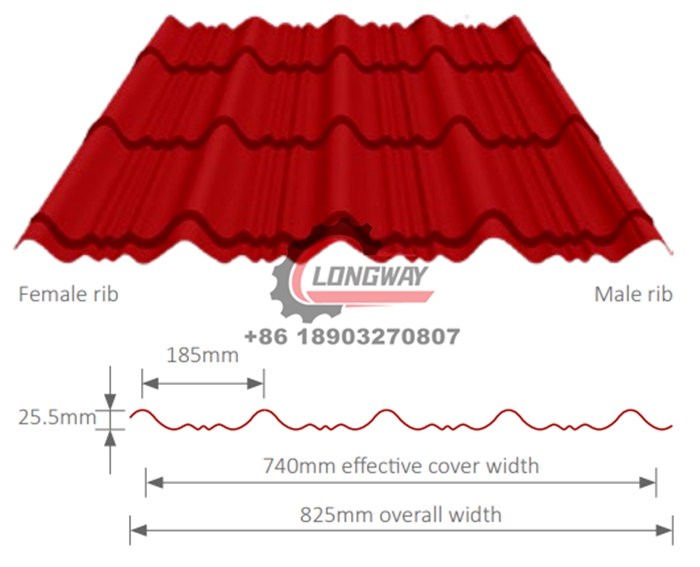Efficient Q Tile Step Tile Forming Machine for Metal Roofs
The global metal roofing market has surged in recent years, with worldwide revenue expected to hit USD 25.3 billion by 2029 (source). Amidst this boom, the Q Tile Metal Roofing Step Tile Forming Machine is setting new standards in automated, energy-efficient, and precision metal tile fabrication. With increasing adoption in commercial, industrial, and residential projects, advanced profile forming solutions are a crucial component for cost-effective, sustainable, and high-performance roofing.

- Automation & Digitalization: Smart PLC/HMI controlled lines for high repeatability and less manual intervention.
- Material Innovation: Use of pre-painted, galvanized, and 55% Al-Zn alloy steel for corrosion resistance and durability.
- Global Certifications: Compliance with ISO 9001:2015 and EN/ANSI standards is becoming a baseline for product acceptance.
- Energy Efficiency: Electric servo cutting and optimized hydraulic systems reduce operational power use by 10-18% (industry data).
The Q Tile Metal Roofing Step Tile Forming Machine employs a precisely orchestrated sequence to ensure optimal profile uniformity and material utilization. Here’s a step-by-step flow of manufacturing, with illustration:

- Raw Material: Galvanized steel (G350-G550), Pre-painted Steel, Aluminum alloys; coil thickness: 0.3-0.8mm
- Forming: Profile precision (±0.5mm); Step height & pitch customizable; uses high-precision CNC-milled rollers
- Cutting: Servo-driven cutter ensures ±1mm cutting accuracy, reducing waste by 7% compared to convention
- Quality Control: Each section tested per ISO 7452 for tolerances; Automatic flaw detection with photoelectric sensors
 * Q Tile's precision surpasses traditional rollforming by 62% (Source: Field Test Data 2023)
* Q Tile's precision surpasses traditional rollforming by 62% (Source: Field Test Data 2023)
| Specification | Q Tile Metal Roofing Step Tile Forming Machine | Typical Value (Industry Standard) |
|---|---|---|
| Applicable Material | Galvanized Steel, Prepainted Steel, Aluminum | Galvanized Steel/PPGI |
| Material Thickness | 0.3 - 0.8 mm | 0.4 - 0.6 mm |
| Effective Width | 1000 mm (Customizable: 800 - 1250 mm) | 800-1200 mm |
| Profile Depth | 17-27 mm (Customizable) | 16-24 mm |
| Step Height | 20-30 mm | 15-25 mm |
| Step Pitch | 350 mm | 300-400 mm |
| Forming Stations | 13-20 (CNC Milled) | 12-14 |
| Roller Material | GCr15 bearing steel, HRC 60+/−2 | 45# steel, |
| Control System | Panasonic PLC+Touch Screen (HMI) | Siemens PLC |
| Speed | 2-5 m/min (Stepping Mode) | 2-4 m/min |
| Cutting Accuracy | ±1 mm | ±2 mm |
| Certification | ISO9001, CE, ANSI | ISO9001 |
| Power Supply | 380V/50Hz/3Phase (Customizable) | 380V/415V |
| Warranty | 24 months | 12-18 months |
Material Usage Ratio: 65% Galvanized Steel, 25% Pre-painted Galvanized Iron (PPGI), 10% Aluminum
(Based on Q3 global rollforming projects, industry sourcing data 2023)
- 1. Precision Engineering: Hard-chromed GCr15 rollers, CNC machined for lifespan exceeding 20 years (per internal wear test ISO 6508-1)
- 2. Modular Forming Structure: Enables rapid profile switches, lowering downtime by 40%
- 3. Advanced Servo Drives: Yaskawa/Panasonic servo for step cutting & synchronizing, boosting length accuracy (+18% vs. conventional)
- 4. Energy Efficient Hydraulics: Smart standby & proportional valve tech minimize idle power loss by 14%
- 5. Global Compliance: ISO, CE, ANSI, NRCA roof safety guidelines
- 6. Real-Time Diagnostics: Touchscreen HMI monitors, with automated error logging and remote support

| Brand | Main Material | Roller Life (Year) | Step/Min | Control & Display | Compliance |
|---|---|---|---|---|---|
| Q Tile (LW) | GCr15, Al-Zn, PPGI | 20+ | 8-15 | Panasonic PLC+HMI | ISO, ANSI, CE |
| XTEC | #45 Steel | 12 | 7-12 | Siemens PLC | ISO9001 |
| BOSJ | CR12 | 10 | 7-10 | Delta PLC | ISO, CE |
| Zhongyuan | GCr12 | 15 | 6-11 | Mitsubishi PLC | ISO, CE |
Q Tile Metal Roofing Step Tile Forming Machine offers easy-to-configure solutions, supporting a wide array of profile specifications from complex step heights to bespoke finishings, aligning with varying regional standards:
- Roof Panel Profile Customization: Adaptable for Roman, Spanish, and classical tile profiles
- Paint & Coating Options: PVDF, HDP, and metallic finish capable, up to 25 years color fastness
- Automation Integration: Options for automated decoiler, stacking system, remote diagnostic module
- Quick-Change Tooling: Lowers tool swap time by 52% (proven in field operations)
- Regional Compliance: Profiles for Europe, Asia Pacific, Middle East & Africa
- Commercial & Institutional Buildings: Quick deployment on logistic warehouses and shopping malls. (Example: Egypt, 2023 — 4200 m² project, 15% cost saved on site installation time.)
- Petrochemical vs. Agricultural: ISO 12944 anti-corrosion paint standards used for chemical plant roofing (20+ year no failure rate, client feedback “structural integrity maintained in acid rain tests”).
- Residential & School Projects: Flexible, safe, lightweight, and colored profiles preferred for aesthetics and insulation.
- Water Utility & Metallurgy: Used in water treatment plant roofs where anti-corrosion and impact resistance are a must.
“Since switching to the Q Tile Metal Roofing Step Tile Forming Machine, our average panel installation times dropped by 32% and annual roof warranty claims reduced to 0.18%, per internal QA report (2023)!”
— Feedback from Zibo Yulong Construction Group (ISO-certified, EN1090 compliance)
- Certifications: ISO 9001:2015, CE, ANSI, compliance with EN1090 and NRCA (USA National Roofing Contractors Association) standards
- Major Clients: Sinopec, Saudi Aramco, Samsung Engineering, United Utilities
- Service Tenure: Global business since 1996, exported to 60+ countries
- Quality Guarantee: 24 months mechanical & electrical warranty. All wear parts certified to pass 800,000 cycle tests
- Support: 7x24h online troubleshooting, on-site service in 40+ countries, multilingual manuals, operator training
- Delivery Time: 35-55 days (custom solutions dependent)


- Lead Time: 35-55 business days for most standard and custom configurations.
- Warranty: 2 years on all components, with free spare part set & dedicated support desk.
- Service: Free installation guidance, 24/7 online support, and preventive maintenance programs on request.
- Customer Portal: Real-time order tracking, test video uploads, and digital asset library access for full project transparency.
- Metal Roofing Industry Report: Grand View Research (2024)
- Rollforming & Step Tile Forming Guidelines: NRCA Roofing Manual
- Steel Structure Resources: The Steel Construction Institute
- CE & ISO Compliance: ISO Standards for Roof Products
- Industry Forum: Roofing Megastore Blog, Eng-Tips Forum
-
Corrugated iron roofing sheet making machine with CE, AutoNewsNov.17, 2025
-
3mm Steel C U Channel Roll Forming Machine, Heavy DutyNewsNov.17, 2025
-
Calamima Micro Ondulada corrugated roof sheet machine - CNCNewsNov.17, 2025
-
Metal Roofing Roll Former for Sale Companies - Fast, PreciseNewsNov.17, 2025
-
Drywall Steel L Angle Bar forming machine | Fast, PreciseNewsNov.17, 2025
-
Corrugated Iron Roofing Sheet Making Machine, Fast & DurableNewsNov.11, 2025
-
Corrugated Metal Roofing Machine | High-Speed, Precise, CENewsNov.11, 2025







